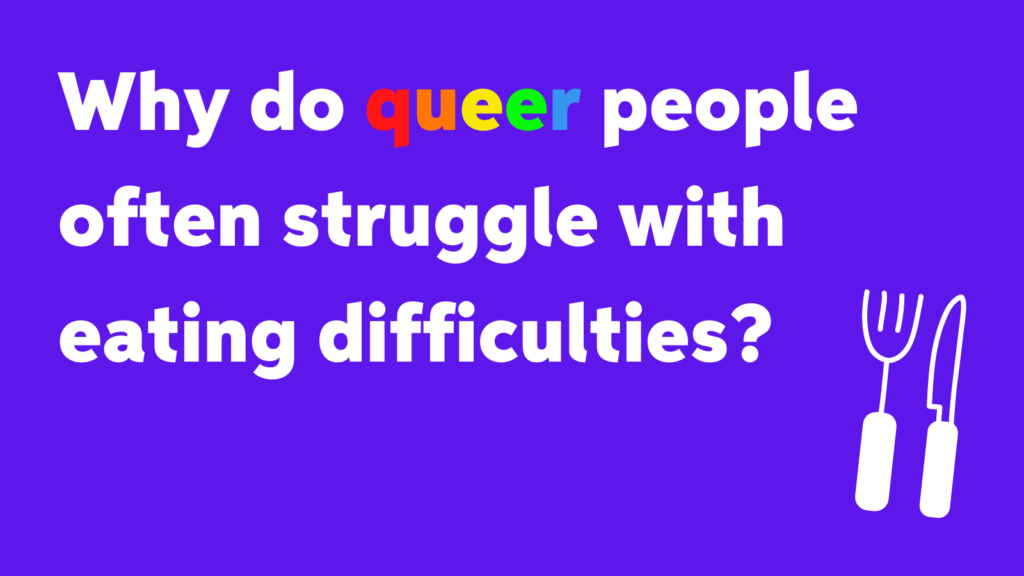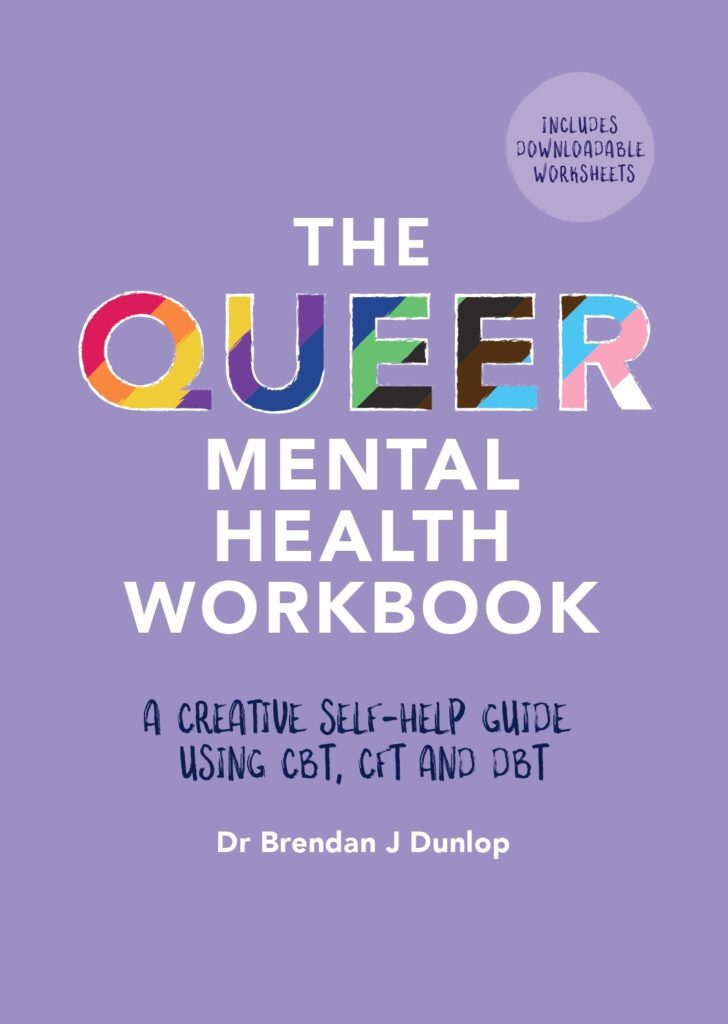
Why queer people often struggle with eating difficulties
People who are Lesbian, Gay, Bisexual, Transgender or Queer (LGBTQ+) are often disproportionately affected by eating difficulties, when compared with heterosexual and cisgender people (Feldman and Meyer, 2007; Parker & Harriger, 2020).
We know that body dissatisfaction, fears of gaining weight and unrealistic beauty standards are all factors connected to ‘disordered’ eating within a general population (Mond et al., 2004; Morris & Katzman, 2003). As well as this, we know that eating difficulties can also be connected to other things, such as feeling unsafe, feeling out of control, wanting to punish yourself and as a way to try make yourself feel better when you’re down (Branley-Bell & Talbot, 2021; Dunlop et al., 2021).
For queer folk, there can be unique considerations and influences alongside (or instead of) these common factors. For trans, non-binary and gender diverse people, these can include tricky feelings connected to gender dysphoria (the negative thoughts and feelings connected to a sense of your internal gender not matching your sex assigned at birth). It is then no wonder that some people experiencing gender dysphoria may pay greater attention to the way they look and may then engage in some unhelpful eating behaviours to try and modify this. For gay and bisexual men especially, eating difficulties can be connected to unrealistic beauty standards within the queer world, and the narrative that your attractiveness and worth is dependent on your physical appearance (it is not, by the way!). For queer folk more generally, there may be feelings of disconnect, rejection or threat connected to their queer identity, given that we live in a heteronormative and cisnormative world, that actively oppresses and marginalised LGBTQ+ people.
Sometimes when we try and do our best to manage or cope with difficulties, we can inadvertently make things worse. For example, whilst restricting food may be used as a strategy to try and modify the way we look, we know that lack of adequate nutrition can often have an impact on our thinking skills. If our thinking skills are not working as they should be, we are less likely to come up with other strategies that we could use to manage our feelings. The result is then often an unhelpful cycle that keeps itself going.
Another example is that some people may purposefully make themselves sick after eating food. This may provide some temporary relief for feelings of ‘fullness,’ though again leaves the body without adequate nutrition, so we may crave food later on in the day or night. This can lead to episodes of eating lots of food all at once (sometimes called ‘bingeing’). You may notice that bingeing because of hunger may lead to the desire to get rid of the consumed food again (sometimes called ‘purging’). What can unfortunately happen though is that the cycle then begins again.
So, what can you do if you think you have an unhealthy relationship with eating? Well, recognising that you may have difficulties with this is the first step. It can be really difficult to ask other people for help, as eating difficulties can be accompanied with feelings of shame. Letting someone close to you know that you are struggling can be really helpful. This can allow another person to help you out if you need support before or after eating, or as a source of distraction if you need to resist the urge to binge or purge.
After this, it can also be very helpful to track your eating behaviours using a ‘food journal’. It is good to record the time you have eaten (or binged/purged/restricted food etc) and note down any thoughts or feelings you are having at the time, including what has just happened before. For example, are you around others or are you alone? Have you had some sad news? Has someone just said something to you? Have you been looking at dieting pages or unhelpful social media sites? It is then also helpful to record if you think the situation you have been in (or what you have done) is in any way related to your queer identity. If you think it is (for example, you might have just been on a queer dating app, and someone has said something to you) then it is good to note this down too. This allows for us to be able to ‘zoom out’ and objectively notice if there are any specific patterns to your eating behaviours, and whether we can make links between the relationship with food and our identity as queer people.

After this, there are several ways in which you can try and help yourself to manage or change your relationship with food. For relevant worksheets, support, self-help resources, tips, tricks and strategies, there is a specific chapter in The Queer Mental Health Workbook focused upon eating difficulties. Alongside this there are numerous other chapters on feeling low, feeling anxious, shame, trauma, self-harm, suicide, relationships, intersectionality, identity and self-compassion/self-acceptance. This is because we know that eating difficulties can often co-occur with other mental health challenges, so it is good to be able to learn some strategies to manage other difficulties too.
There are also specialist charities and support services that can support you. I have listed these below. It is always recommended that you seek medical attention from your General Practitioner (GP) or family doctor if you have difficulties with eating. This is because there can be long-term physical health effects of certain behaviours, including an impact on the functioning of some of our major organs.
Living with eating difficulties can really take a toll on our wellbeing, relationships and mental health. Reading this blog post may have also been a huge step in your recovery journey, as you may have realised that something does not feel quite right for you and you are wanting to explore ways of managing differently. If so, then a huge well done for taking that first step. I will be cheering you on from the metaphorical side-lines and I wish you all the very best for this journey!
The Queer Mental Health Workbook by Dr Brendan J Dunlop is out on 21st March.
Support services:
Beat (UK): 0808 801 0677 / beateatingdisorders.org.uk
National Centre for Eating Disorders (UK): 0845 838 2040 / https://eating-disorders.org.uk
Anorexia and Bulimia Care (UK): 0300 011 1213 / https://www.anorexiabulimiacare.org.uk
Overeaters Anonymous (UK): https://www.oagb.org.uk
Duke Health (USA): https://eatingdisorders.dukehealth.org